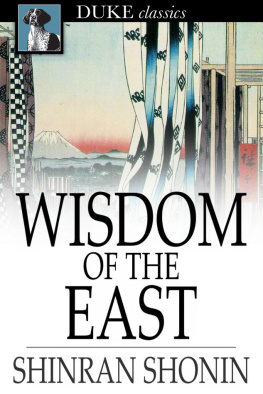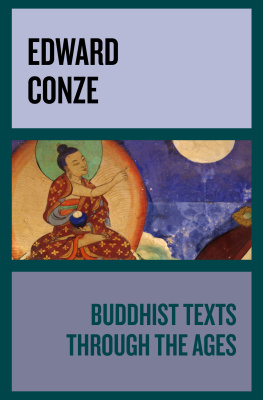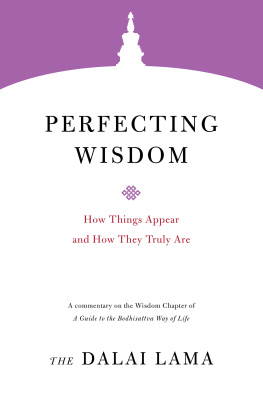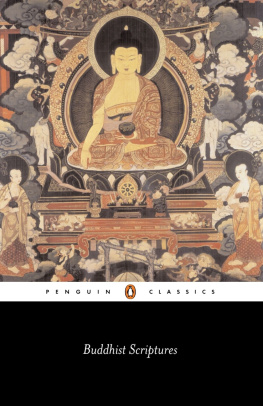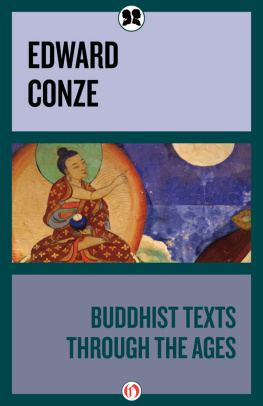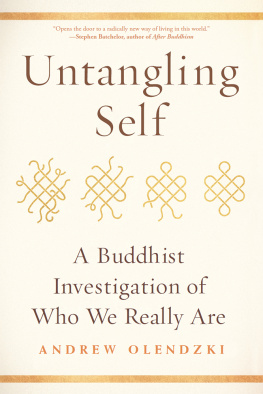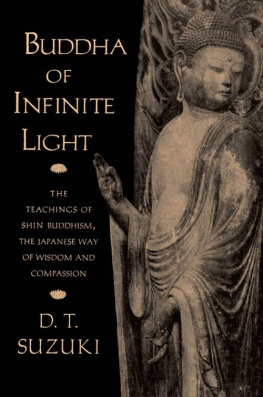WISDOM OF THE EAST
BUDDHIST PSALMS TRANSLATED FROM THE JAPANESE OF SHINRAN SHONIN
* * *
SHINRAN SHONIN
Translated by
S. YAMABE
L. ADAMS BECK
*
Wisdom of the East
Buddhist Psalms translated from the Japanese of Shinran Shonin
ISBN 978-1-62011-621-0
Duke Classics
2012 Duke Classics and its licensors. All rights reserved.
While every effort has been used to ensure the accuracy and reliability of the information contained in this edition, Duke Classics does not assume liability or responsibility for any errors or omissions in this book. Duke Classics does not accept responsibility for loss suffered as a result of reliance upon the accuracy or currency of information contained in this book.
Contents
*
Introduction
*
It is a singular fact that though many of the earlier BuddhistScriptures have been translated by competent scholars, comparativelylittle attention has been paid to later Buddhist devotionalwritings, and this although the developments of Buddhism in Chinaand Japan give them the deepest interest as reflecting the spiritualmind of those two great countries. They cannot, however, beunderstood without some knowledge of the faith which passed soentirely into their life that in its growth it lost some of its owninfant traits and took on others, rooted, no doubt, in thebeginnings in India, but expanded and changed as the features of thechild may be forgotten in the face of the man and yet perpetuate theunbroken succession of heredity. It is especially true that Japancannot be understood without some knowledge of the Buddhism of theGreater Vehicle (as the developed form is called), for it was theinfluence that moulded her youth as a nation, that shaped heraspirations, and was the inspiration of her art, not only in thewritten word, but in every art and higher handicraftsmanship thatmakes her what she is. Whatever centuries may pass or the futurehold in store for her, Japan can never lose the stamp of Buddhism inher outer or her spiritual life.
The world knows little as yet of the soul of Mahayana Buddhism,though much of its outer observance, and for this reason a crucialinjustice has been done in regarding it merely as a degraded form ofthe earlier Buddhisma rank off-shoot of the teachings of theGautama Buddha, a system of idolatry and priestly power from whichthe austere purity of the earlier faith has passed away.
The truth is that Buddhism, like Christianity, in every countrywhere it has sowed its seed and reaped its harvest, developed alongthe lines indicated by the mind of that people. The Buddhism ofJapan differs from that of Tibet as profoundly as the Christianityof Abyssinia from that of Scotlandyet both have conserved theessential principle.
Buddhism was not a dead abstraction, but a living faith, and ittherefore grew and changed with the growth of the mind of man,enlarging its perception of truth. As in the other great faiths, theascent of the Mount of Vision reveals worlds undreamed, andproclaims what may seem to be new truths, but are only new aspectsof the Eternal. Japanese Buddhists still base their belief on theutterances of the Buddhas, but they have enlarged their conceptionof the truths so taught, and they hold that the new flower and fruitspring from the roots that were planted in dim ages before theGautama Buddha taught in India, and have since rushed hundred-armedto the sun. Such is the religious history of mankind, and Buddhismobeys its sequence.
The development of Mahayana Buddhism from the teaching of theGautama Buddha has been often compared with that of the Christianfaith from the Jewish, but it may be better compared with the growthof a sacerdotal system from the simplicities of the Gospel ofSt. Mark. That the development should have been on the same lines inall essential matters of symbol and (in the most important respects)of doctrine, modified only by Eastern habits of thought andenvironment, is a miracle of coincidence which cannot be paralleledin the world unless it be granted that Christianity filtering alongthe great trade routes of an earlier world joined hands withBuddhism in many unsuspected ways and places. Evidence isaccumulating that this is so, and in a measure at present almostincredible. And if it be soif it be true that in spite of racialdistinctions, differences of thought and circumstance, the religiousthought of East and West has so many and so great meeting-points,the hope of the world in things spiritual may lie in the recognitionof that fact and in a future union now shadowed forth only in symboland in a great hope. This, however, is no essay on Buddhism, eitherearlier or later, and what I have said is necessary to theintroduction of these Jodo-Wasan, or Psalms of the Pure Land, whichare a part not only of the literature, but also of the daily worshipand spiritual life of Japan. Their history may be briefly told.
Buddhism passed into Japan from China and Korea about 1320 yearsago, in or about the year A.D. 552. It adapted itself with perfectcomprehension to the ideals of the Japanese people, inculcatingamong them the teachings of morality common to the great faithswith, in addition, the spiritual unction, the passion of love andsympathy, self-devotion, and compassion, in which Buddhism andChristianity are alike pre-eminent. The negative side of Buddhism,with its passionless calm and self-renunciation, is the only onethat has been realised in the West, and the teachings of Mahayanawhich have borne fruit and flower, visible to all the world, ofhappiness, courtesy, kindliness in the spiritual attitude of a wholepeople, have never received the honour which was their due.
For with the Buddhist faith there came the germ of the belief thatthe Gautama Buddha in his own grandeur bore witness to OneGreaterthe Amitabha or Amida Buddhathat One who in boundlesslight abideth, life of the Universe, without colour, without form,the Lover of man, his Protector and Refuge. He may, He must beworshipped, for in Him are all the essential attributes of Deity,and He, the Saviour of mankind, has prepared a pure land of peacefor his servants, beyond the storms of life and death. This beliefeventually crystallised and became a dogma in the faith of the PureLand, known in Japan as Jodo Shinshu, a faith held by the majorityof the Japanese people. It is a Belief which has spread also inEastern Siberia, many parts of China, Hawaii, and, in fact,whereever the Japanese race has spread. And the man who stated thisbelief for all time was Shinran Shonin, author of the Psalms herepresented.
He was born in the year A.D. 1175 near City-RoyalKyoto, theancient capital of Japan. He was a son of one of the noblestfamilies, in close connection with the Imperial House, and had itnot been for the passion for truth and the life of the spirit whichconsumed him, his history would have been that of the many otherbrilliant young men who sank into mere courtiers"Dwellers abovethe Clouds," as the royalties and courtiers of the day were calledamong the people. But the clear air above the clouds in which hisspirit spread its wings was not that of City-Royal, and the Wayopened before him as it has opened before many a saint of theChristian Church, for while still a child he lost both his parents,and so, meditating on the impermanence of mortal life, and seeinghow the fashion of this world passes away, he abandoned his titleand became a monk in one of the noble monasteries whose successorsstill stand glorious among the pine woods above Lake Biwa.

